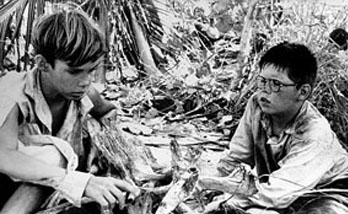Childhood/Decay
At the start of this chapter Golding says: ‘childhood’ is fading for Ralph in a ‘new mood of comprehension’ [understanding]. He ‘discovered dirt and decay’. When he sits, he is a ‘darkish figure’.
 Ralph thinks: ‘I can’t think. Not like Piggy.’ He ‘had to adjust his values’. He says they need to “put things straight.”
Ralph thinks: ‘I can’t think. Not like Piggy.’ He ‘had to adjust his values’. He says they need to “put things straight.”Ralph’s Emergency Assembly
He talks about water, shelter and hygiene “this place is getting dirty”. Then he talks about the importance of the fire: “we’ve got to make smoke up there – or die”. “Things are breaking up. I don’t understand why.” Then he thinks of the ‘beastie, the snake, the fire, the talk of fear.’ He says, we need to “be happy”
Beast and Blame
Jack stands up and blames “you littuns.” “you’re a lot of cry-babies and sissies” “fear can’t hurt you any more than a dream” “there is no animal” [this is the first time they use the word ‘animal’ for their vague fears]
“What would a beast eat?”
“Pig.”
“We eat Pig.” [Golding implies: the boys eat pig; therefore the boys are the beast]
Piggy gives a “scientific” denial of the beast. “Unless we get frightened of people.” [this is really the central point of the novel]
Phil (littlun) says “I saw something big and horrid moving in the trees”.
Simon admits that this was him. Golding reminds us again of the absent (dead) boy with the mulberry mark. Percival also speaks, but as he recites his home address, won’t stop crying, ‘a silent effigy of sorrow’, ‘lamentation’, ‘the crying… seemed to sustain him upright as if he were nailed to it’ [cf the crucifixion of Christ]. The other boys try to force him to “Shut up! Shut up!”
Maurice ‘clowns’ and distracts them.
Jack shakes Percival: “He says the beast comes out of the sea.”
‘The last laugh died away.’
Original Sin/Evil
Simon says “Maybe there is a beast.” ‘his heartbeats were choking him’ “Maybe it’s only us.” ‘Simon became inarticulate in his effort to express mankind’s essential illness… “What’s the dirtiest thing there is?” Jack tells a rude joke and Simon loses ground.
‘the careful plan of this assembly had broken down.’
‘The world, that understandable and lawful world, was slipping away.’
Piggy (furiously): “What are we? Humans? Or animals? Or savages?”
Jack starts talking out of turn. Ralph: “The rules are the only thing we’ve got.” Jack: “Bollocks to the rules!”
Ralph: “things are going rotten.” The hunters run away. Ralph says: “If I blow the conch and they don’t come back then we’ve had it. We shan’t keep the fire going. We’ll be like animals. We’ll never be rescued.”
Piggy: “If you don’t blow, we’ll soon be like animals anyway.”
Ralph then starts to doubt. What if things “don’t make sense? Not here, on this island?”
Ralph describes himself, Piggy and Simon as “three blind mice”.
Piggy about Jack: “I’m scared of him” “He hates you too, Ralph.”
They long for “a grown-up” “an answer” “my auntie” “my father” ‘The three boys stood in the darkness, striving unsuccessfully to convey the majesty of adult life.’
Ralph: “If only they could send us a sign.”
The chapter ends with Percival Wemys Madison chanting, madly to himself – seeking comfort and gaining none.
Ralph: “things are going rotten.” The hunters run away. Ralph says: “If I blow the conch and they don’t come back then we’ve had it. We shan’t keep the fire going. We’ll be like animals. We’ll never be rescued.”
Piggy: “If you don’t blow, we’ll soon be like animals anyway.”
Ralph then starts to doubt. What if things “don’t make sense? Not here, on this island?”
Ralph describes himself, Piggy and Simon as “three blind mice”.
Piggy about Jack: “I’m scared of him” “He hates you too, Ralph.”
They long for “a grown-up” “an answer” “my auntie” “my father” ‘The three boys stood in the darkness, striving unsuccessfully to convey the majesty of adult life.’
Ralph: “If only they could send us a sign.”
The chapter ends with Percival Wemys Madison chanting, madly to himself – seeking comfort and gaining none.
